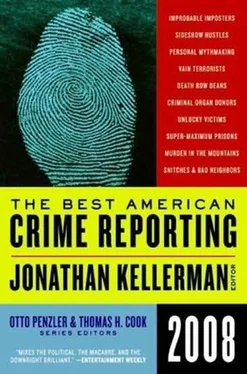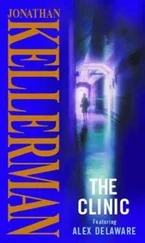On October 27, Dowery, along with his lawyer and the prosecutor handling his gun charge, met with Michael Baier, the Baltimore homicide detective assigned to Jay’s murder. Dowery told Baier what he knew about the killing. He also said that Boo-Boo and Moo-Moo, who were still hanging around Bartlett, had ditched their distinctive white Lexus. His statement provided a crucial break in the case.
Another break came the following week, when Joseph Bassett, Jay’s accomplice, was busted selling heroin to undercover cops. With his long rap sheet, Bassett knew he was in trouble. He tried offering up an illegal.32 he kept at home, in the hope that the officers would let him go in exchange for getting the gun off the street. When that failed, he said he might know something about a murder on Bonaparte. The officers brought Bassett downtown to homicide, where he told Baier about robbing Reds. He also said he had seen two men in a white Lexus circling the block, and that he saw the car stop and a man get out and shoot Jay. Baier showed him a photo lineup. Bassett identified Tracy Love as the driver of the car and Tamall Parker as the shooter.
Parker and Love were picked up two days later. Baier had several other pieces of evidence: The two suspects’ mother had recently returned to the dealership a white Lexus with the temporary license tag 38491L. Video from a warehouse surveillance camera near the murder scene had captured what appeared to be a white Lexus circling the block in the minutes before Jay was killed. An analysis of Love’s cell phone records determined that the phone had not left East Baltimore that day, a finding that directly contradicted Love and Parker’s alibi: They said they had spent the day in their mother’s hair salon, in West Baltimore.
Baier did not have a confession or a murder weapon, however. So at trial, a lot would depend on the testimony of Dowery and Bassett-convicted felons who had come forward at least in part because they were facing charges themselves. Eventually they would be joined by a third witness, also in trouble with the law: Doris Dickerson, picked up for prostitution, told police that she was heading toward Jay when she heard shots. She saw Jay fall to the ground and Moo-Moo run away. She too identified Parker as the killer from a photo lineup.
Witnesses of this sort would once have made a prosecutor blanch. Now, they are usually all prosecutors have. One problem with such witnesses is that defense attorneys can use their records to attack their credibility. The fewer witnesses the state has and the more a defense attorney expects to be able to discredit them, the more likely she is to advise her client against a plea bargain. This means more cases go to trial, at significant expense to the state. And at trial, there is a decent chance-in Baltimore, about 50 percent in a nonfatal shooting, and 38 percent in a murder-that the defendant will walk.
Witnesses in the drug trade are also highly susceptible to being coerced into changing their stories or not showing up in court. If a witness goes missing, his prior statements generally aren’t admissible. And a witness who “backs up”-legal slang for recanting-can create doubt, including reasonable doubt, in the minds of jurors.
Not surprisingly, defense attorneys have a different take. Elizabeth Julian, Baltimore’s chief public defender, believes the problems of witness intimidation are overstated. She told me that the real issue is police tactics that encourage suspects to lie about their knowledge of other crimes, and she pointed out that it is perfectly legal for police to mislead potential witnesses into thinking they won’t have to testify in court. “If you are being asked, and you are getting a ‘Get Out of Jail Free’ card tonight, people take it. That’s human nature,” she says. In her view, many witnesses who back up are telling the truth on the stand. It’s their initial statements that were false-either outright fabrications or some mixture of fact and rumor. Julian jokes that the word on the street, rather than “Stop snitching,” ought to be “Stop lying.”
AS IT HAPPENED, Dowery decided to become a witness just as witness intimidation in the city was about to explode into a national story. The spark was an underground DVD titled Stop Fucking Snitching that began circulating in Baltimore in November 2004. In it Rodney Thomas, a rapper known locally as Skinny Suge, talks about what he thinks should happen to informants: “To all you snitches and rats…I hope you catch AIDS in your mouth, and your lips the first thing to die, yo bitch.” The DVD also includes numerous segments in which young men on the street rail against snitches.
In its subject matter, the DVD was more evolution than revolution. The slogan “Stop snitching” had been around since at least 1999, when it was popularized by the Boston rapper Tangg da Juice. The video would have remained a local curiosity except for one thing: It includes a cameo by Carmelo Anthony, a Baltimore native who became an NBA star with the Denver Nuggets. Anthony appears in only six of the film’s 108 minutes, and spends most of that time poking fun at a former coach and a rival player. As he later told The Baltimore Sun , “I was back on my block, chillin’. I was going back to show love to everybody, thinking it was just going to be on the little local DVD, that it was just one of my homeboys recording.” But his celebrity, combined with the DVD’s charged subject matter, created a sensation.
For Baltimore’s police, prosecutors, and judges, eager to raise awareness about witness intimidation, Stop Fucking Snitching was a gift. “Think how bold criminals must be to make a DVD,” Baltimore Circuit Judge John M. Glynn told the local press. “It shows that threatening snitches has become mainstream.” Patricia Jessamy, the state’s attorney for Baltimore, had hundreds of copies made and distributed them to politicians and the national media. The publicity helped her win passage of a tougher witness-intimidation law, one the Maryland legislature had voted down the year before. The police department made a show of arresting the DVD’s stars, including a man accused of carrying out contract killings, and created its own video, Keep Talking , to encourage future witnesses to come forward.
Stop Fucking Snitching was produced by Rodney Bethea, a 33-year-old barber and entrepreneur. I met him in his small West Baltimore store, One Love Underground, which pulls double duty as a barbershop and a boutique from which he sells his own line of urban fashions. Bethea told me the authorities and media had misinterpreted the DVD. It was not intended to encourage violence against witnesses, he said; he had simply set out to make a freestyle documentary, and snitching happened to emerge as a major theme. He also said that the term snitch has a very specific meaning on the streets and in the video. “They are referring to people that are engaged in illegal activities, making a profit from it, and then when it comes time for the curtains to close-you do the crime, you do the time-now no one wants to go to jail,” he told me, pulling on his goatee. “That is considered a snitch. The old lady that lives on the block that call the police because guys are selling drugs in front of her house, she’s not a snitch, because she is what would be considered a civilian.”
Bethea believes there is a double standard-and perhaps a tinge of racism-in law enforcement’s criticism of the “Stop snitching” culture. “When you think about it, I mean, who likes a snitch?” he said. “The government don’t like a snitch. Their word for it is treason. What is the penalty for treason?” He pointed out that the police have their own code of silence, and that officers who break it by reporting police misconduct are stigmatized in much the same way as those who break the code of silence on the street.
Читать дальше












